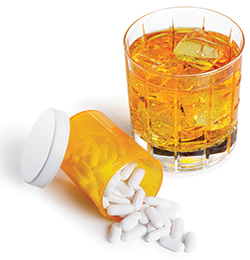Alcohol, Medicines and Aging

Alcohol, Medicines and Aging
You’ve probably seen warnings on medicines about mixing them with alcohol. Doing so can cause nausea and vomiting, headaches, drowsiness, fainting, or loss of coordination. You can be at risk for internal bleeding, heart problems, and difficulty breathing. Alcohol can make a medication less effective or even useless, or it may make it harmful or toxic to your body.
Stay Informed, Stay Safe
Knowing what’s in your medications—and how they interact with alcohol—will help keep you safe and your medicines working effectively.
Medications typically are safe and effective when used appropriately, and your pharmacist or other health care provider can help you determine which medications interact harmfully with alcohol. You should also read the label on the medication bottle to find out exactly what ingredients a medicine contains.
Some medications, including many that can be purchased without a prescription, contain one or more ingredients that can react with alcohol. In particular, sedative-hypnotic drugs (e.g. sleep aids, anti-anxiety drugs, and drugs that suppress arousal) amplify the depressant effects of alcohol, and drinking alcohol while taking these drugs may be especially dangerous. Other medications that can react with alcohol include many popular painkillers and cough, cold, and allergy remedies. Even some herbal remedies can have harmful effects when combined with alcohol. And it is very important to remember—alcohol and medicines can interact harmfully even if they are not taken at the same time.
Older Adults and Women Need To Be Particularly Vigilant
Even without medication interactions, alcohol can pose a particular risk for certain groups, including women and older people. Women have a higher risk of alcohol-related problems than men do, because women’s bodies generally have proportionately less water than men’s. This means that when a woman drinks, the alcohol in her bloodstream typically reaches a higher level than a man’s even if both are drinking the same amount.
Because the amount of water in the body declines with age, older people reach higher blood alcohol concentrations after each drink than younger people. Meanwhile, as we age we become more sensitive to some of the impairments alcohol produces. On tests that require quick and accurate responses, older adults are affected more than younger adults after a few drinks. Similarly, balance, concentration, attention, and driving skills also are impaired more in older versus younger adults after a few drinks.
Adding medication to the equation can make the situation even more complicated. Larger impairments in older drinkers could contribute to injuries (especially from falls) and can make already harmful medication interactions more dangerous. Older people also are more likely to take a medication that interacts with alcohol—they often need to take more than one of these medications.
Paying attention to your drinking patterns and your medications—particularly for women and older adults—is an easy way to stay healthy and safe.
Fast Facts
- You can become more sensitive to alcohol as you get older.
- Heavy drinking can make some health problems worse.
- Medicines and alcohol don’t mix.
- Taking aspirin and drinking alcohol can raise the chance of bleeding in your stomach.
- You can get very sleepy if you drink alcohol and take cold or allergy medicines.
- Drinking alcohol while taking some sleeping pills, pain pills, or anxiety or depression medicine can be very dangerous.
- You can hurt your liver if you drink and take a lot of painkillers that have the word “acetaminophen” on the label. Always check warning labels.
(Articolo pubblicato dal CUFRAD sul sito www.alcolnews.it)
